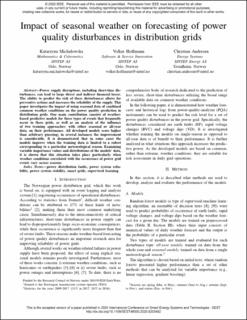| dc.contributor.author | Michałowska, Katarzyna | |
| dc.contributor.author | Hoffmann, Volker | |
| dc.contributor.author | Andresen, Christian Andre | |
| dc.date.accessioned | 2021-12-15T13:57:51Z | |
| dc.date.available | 2021-12-15T13:57:51Z | |
| dc.date.created | 2020-09-24T12:30:42Z | |
| dc.date.issued | 2020 | |
| dc.identifier.isbn | 978-1-7281-4701-7 | |
| dc.identifier.uri | https://hdl.handle.net/11250/2834509 | |
| dc.description.abstract | Power supply disruptions, including short-time disturbances, can lead to large direct and indirect financial losses. The ability to predict the risk of these disturbances allows for preventive actions and increases the reliability of the supply. This paper investigates the impact of using seasonal data of combined common weather conditions on the power quality prediction in distribution grids. Our main contribution consists of weatherbased predictive models for three types of events that frequently occur in these grids, as well as an analysis of the influence of two training approaches: with either seasonal or all-year data, on their performance. All developed models score higher than arbitrary guessing; in several instances the improvement is considerable. It is demonstrated that in some cases the models improve when the training data is limited to a subset corresponding to a particular meteorological season. Examining variable importance values and distributions of the models’ data, it is shown that this situation takes place particularly when weather conditions correlated with the occurrence of power grid events vary across seasons | en_US |
| dc.language.iso | eng | en_US |
| dc.publisher | IEEE | en_US |
| dc.relation.ispartof | 2020 International Conference on Smart Energy Systems and Technologies - SEST | |
| dc.subject | power quality | en_US |
| dc.subject | power quality disturbances | en_US |
| dc.subject | distribution grids | en_US |
| dc.title | Impact of seasonal weather on forecasting of power quality disturbances in distribution grids | en_US |
| dc.type | Chapter | en_US |
| dc.description.version | acceptedVersion | en_US |
| dc.rights.holder | © 20XX IEEE. Personal use of this material is permitted. Permission from IEEE must be obtained for all other uses, in any current or future media, including reprinting/republishing this material for advertising or promotional purposes, creating new collective works, for resale or redistribution to servers or lists, or reuse of any copyrighted component of this work in other works.” *IEEE policy provides that authors are free to follow funder public access mandates to post accepted papers in repositories. When posting in a repository, the IEEE embargo period is 24 months. However, IEEE recognizes that posting requirements and embargo periods vary by funder. IEEE authors may comply with requirements to deposit their accepted manuscripts in a repository per funder requirements where the embargo is less than 24 months. | en_US |
| dc.source.pagenumber | 6 | en_US |
| dc.source.journal | 2020 International Conference on Smart Energy Systems and Technologies - SEST | en_US |
| dc.identifier.cristin | 1832993 | |
| dc.relation.project | Norges forskningsråd: 268193 | en_US |
| cristin.ispublished | true | |
| cristin.fulltext | postprint | |
| cristin.qualitycode | 1 | |
